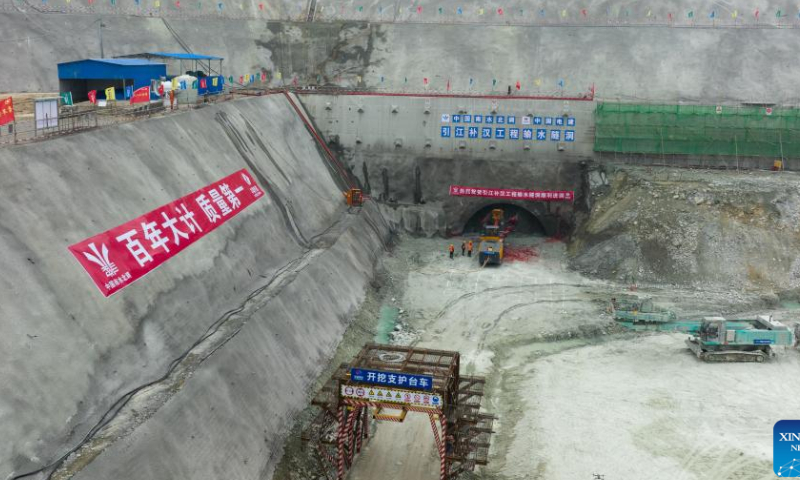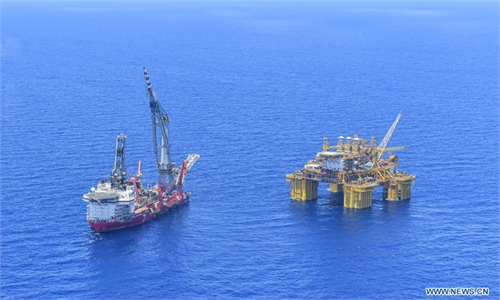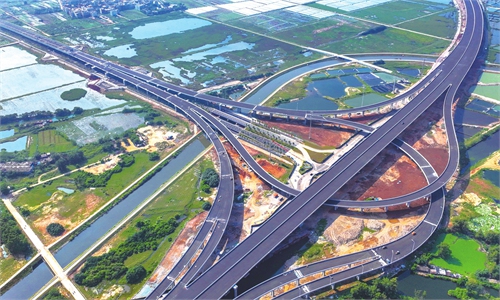Regions accelerate construction of major projects; total 2023 investment nears 10tr yuan

This aerial photo taken on Feb. 18, 2023 shows the construction site of an underground water-transfer tunnel in Danjiangkou, central China's Hubei Province. Photo: Xinhua
Chinese provinces and regions have accelerated the construction of major projects ahead of this year's two sessions, with the total amount of investment that has been made public by 18 provinces and regions reaching nearly 10 trillion yuan ($1.44 trillion), and the investment structure has been optimized to cover more science and technology industries.
The construction of 15 major projects in the Nanming district in Guiyang, Southwest China's Guizhou Province was launched on Monday, covering key sectors including electronic information manufacturing, industrial parks and the digital economy, according to the local government.
In the first quarter, the province launched 687 key projects with total investment of more than 376.7 billion yuan.
The total investment in 18 provincial-level regions that has been made public is 9.65 trillion yuan, news outlet Yicai reported. Some regions didn't disclose these figures, according to the report.
The investment of these provinces and regions this year is characterized by two features -- the growth of total investment and the optimization of its structure.
For instance, North China's Inner Mongolia Autonomous Region plans 3,168 major projects this year with total investment of 3.2 trillion yuan, of which 774 billion yuan will be invested this year, up 140 billion yuan compared with last year, data from the local government showed.
On February 18, Southwest China's Chongqing Municipality launched the construction of 354 projects for the first quarter, with investment totaling 319.4 billion yuan, covering sectors including electronics, new-energy vehicles and the digital economy.
Chongqing plans to implement more than 1,100 major projects this year, with a total investment of nearly 3 trillion yuan, according to a report on the local government's website.
In addition to large infrastructure projects such as railways, highways, airports and water conservation facilities, the list includes projects involving high-end equipment, new energy and the digital economy.
In Shanghai, 77 of the 191 major projects planned for this year are related to the science and technology industries, data from the Shanghai Municipal Development and Reform Commission showed.
The sound growth momentum of China's infrastructure investment is promoting optimistic expectations for the recovery of the country's engineering machinery sector, with relevant shares having climbed over 20 percent since January.
UBS economists said in a note sent to the Global Times on Tuesday that China's fiscal multiplier is expected to rise in 2023, and the growth rate of infrastructure investment may slow to 5-6 percent from 11.5 percent in 2022.
China has rolled out a plan for the overall layout of the country's digital development. According to the plan, important progress will be made in the construction of a digital China by 2025, with effective interconnectivity in digital infrastructure, a significantly improved digital economy, and major breakthroughs achieved in digital technology innovation.
Cao Heping, an economist at Peking University, told the Global Times that the digital economy will serve as a new source of momentum for China's high-quality development. He said there are investment opportunities in the digital upgrading of railways, ports and other infrastructure facilities, improving internet networks in rural areas and the building of computing infrastructure.
The implementation of major infrastructure projects will play a pivotal role in maintaining economic growth, adjusting the economic structure and ensuring high-quality development, Tian Yun, an independent macro-economy analyst, told the Global Times on Tuesday.
"Although the consumption recovery will be obvious in 2023, there is huge pressure facing export. If provinces vow to achieve the economic growth targets they set - over 5.5 percent on average - stable investment is indispensable," Tian noted.
"The main problem is whether the source of funds can be adequately guaranteed. According to data released in January, more than 600 billion yuan of local government bonds were issued. If this pace or intensity is maintained, then financing support should be enough," said Tian.
The tone-setting Central Economic Work Conference in December pointed to efforts to stimulate private investment through government investment and policy measures, accelerate the implementation of major projects for the 14th Five-Year Plan period (2021-25) and strengthen infrastructure connect among different regions.


